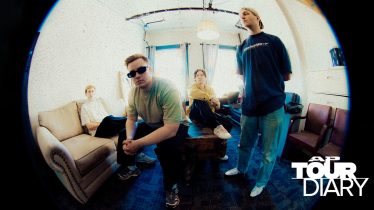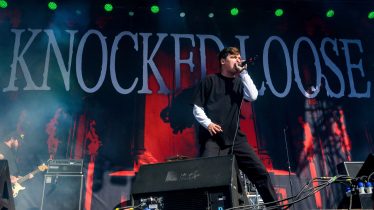10 Bands We Wish Never Broke Up
Oh, the bags of Cool Ranch Doritos we’ve gone through in the name of heartache! Oh, the sweet, sweet vinyl we’ve worn into ridgeless plates! Oh, the merch we wore all at once as an act of sartorial protest! There is a special place in the Heartbreak Hotel for those suffering in the wake of a breakup—a band breakup, that is. Here are 10 groups we wish never unplugged their amps, embarked on dubious side projects or otherwise left us fans without a future. Please, save us from the inevitable tribute albums …
BLOOD BROTHERS
If all it took to fortify post-hardcore was furious tempos, jagged guitar lines, caustic electronics and two vocalists who sounded like jet turbines ascending, well, every precious nimrod with a Starbucks addiction would have done it and taken it to the bank, right? The Blood Brothers came out of Seattle with a musical vision that felt like being trapped in a small room while several dozen people fired Hi-Bounce balls at you from above. Over the course of five albums, these five auteur savants bridged the worlds of hardcore force, indie pretension and savage noise with a finesse that still elicits responses that are always polarizing, never benign. They broke up quietly in 2007, splintering into two bands, Past Lives and Jaguar Love. Then for six nights last summer, the Bloods reteamed to bring their idiosyncratic hardcore onslaught to festival stages and exclusive club gigs, as if to put a much-needed exclamation point on their legacy. While many have tried to approximate the sound of being trapped in a meat locker with concussion grenades duct-taped to their chests, only the Bloods had the twisted vision and good sense to pull it off. —Jason Pettigrew
CHASING VICTORY
In 2005, Chasing Victory signed to the beloved Mono Vs. Stereo Records and released their widely undiscovered debut LP, I Call This Abandonment. The record found the perfect collective balance between melody and maelstrom, bouncing back and forth seamlessly between blistering riffs and soaring melodies—I Call This Abandonment is truly a post-hardcore masterpiece. After it, the band returned in 2007 for what would be their final studio effort, Fiends, which boasted a different sound entirely when compared to their debut. The group settled in a comfortable groove of post-grunge slathered in the grooves of southern rock, distant heaviness and even jazz influences. Sure, Chasing Victory never received anywhere near the exposure they deserved during their time together, but we still have these two incredible records to bask in their divergent glory. —Tyler Sharp
DAYS AWAY
These forgotten Fueled By Ramenites really hit their stride with the one-two punch of 2005’s Mapping An Invisible World and 2007’s Ear Candy For The Headphone Trippers EP before disbanding. You’ll be hard-pressed to find a better soundtrack for desperately waiting for spring. There’s optimism in their subdued emo-pop ways; the group had a penchant for jamming away on their effects pedals (most noted in closing argument “T. Klines Decline”). We can’t blame them for finding more success in Good Old War, but this band sure is missed by those in the know. —Brian Kraus
DESTROY REBUILD UNTIL GOD SHOWS
Question: Are you a fan of Chiodos? How about From First To Last? Matchbook Romance? Story Of The Year? Because if you are/were, 2010 was your year and Destroy Rebuild Until God Shows was your band. The supergroup to end all supergroups, D.R.U.G.S. formed after singer Craig Owens split ways with Chiodos and came back with a fiery vengeance. “Be honest, did you ever mention my name?” Owens snarled on “If You Think This Song Is About You It Probably Is,” the band’s extremely cutting debut track. “Did you get sick of the shame?” After teaming with Pete Wentz’s label Decaydance, the group released their sole, self-titled album, which was so good you almost forgot about the whole Chiodos incident—in part thanks to the masterful mechanics of producer John Feldmann. Owens later returned to his old band, and D.R.U.G.S. were scrapped. I was not pleased. —Matt Crane
JAWBREAKER
Whether you believe the “emo revival” is a real thing or just a worn-out buzz phrase, it’s undeniable that lately, several massively influential bands associated with that musical movement (Mineral, American Football, Drive Like Jehu) have been returning to the stage after years out of the spotlight. While that’s pretty incredible for any emo fan who started going to shows just after the mid-’90s golden era ended (like myself), and never got a chance to see these bands the first time around, there’s still one huge act remaining on everyone’s emo reunion wish list: Jawbreaker. Disbanding in 1996 after a 10-year run, Jawbreaker seemed to hang it up just as many of their similar-sounding peers were finding mainstream success. Frontman Blake Schwarzenbach famously went on to form Jets To Brazil (another band I wish was still around), and currently plays in a group called Forgetters. Emo kind of had to fade away to allow the mainstream oversaturation to run its course, and to give a new crop of bands a chance to put their own spin on the scene. But Jawbreaker seem like a band who never would have “sold out,” and could still be playing clubs to a cult fan base today. For them, “breaking up” might have been synonymous with “growing up,” but, had Blake injected some of his Jets To Brazil impulses into Jawbreaker, while similar bands’ success helped expose them to a wider audience, it would have been interesting to see their evolution, and triumphant to see the public’s inevitable renewal of interest as their sound fell back into vogue. There have been rumblings of a reunion for a few years now, despite hesitations from Schwarzenbach (I got a solid tip that they came really, really close in 2013), so future shows might not be completely out of the question. —Philip Obenschain
PAVEMENT
If you’re a word nerd or a weird youth or a person who had more than a passing devotion to nerd-core/emo-pop post-grungers Weezer (shout out to my 2004 AIM screen name, weezerchick3191), then you’ve probably know Pavement by now. When I first heard 1991’s Slanted and Enchanted, it was 2005.I was 14, new to high school, and approximately six years too late to ever see Pavement live. Stephen Malkmus was the tongue-twisting, slacker voice of someone else’s generation, but I took him as my own, decoding possible meanings of “In The Mouth A Desert” and plunking out the bassline to “Cut Your Hair” on my first boyfriend’s bass. Independent spirit, loopy subject matter, fearless and careening melodic messes, layered power chords, perfect flannels—these dudes were it, even though they were done. Though I love the Jicks and the Silver Jews and Preston School Of Industry, I’ve always wanted Spiral Stairs, Steve and the rest of the dudes to just hack it for one more album, even if that meant some weird forays into like, experimental Appalachian throat-singing. That album has never materialized, but I stubbornly hold out hope. I got tickets to one of their reunion tour shows in Chicago in 2010, which I promptly had to sell because of work. A friend went and told me he was “riding those ’91 vibes.” That’s the year I was born, in more ways than one. —Lee McKinstry
THE PLOT TO BLOW UP THE EIFFEL TOWER
It’s well known that sharks eat everything. How many times have you seen some fisherman slit the belly of one of those toothy bastards and find everything from ocean debris to random junk you’d find on the treelawn on your neighborhood’s trash pickup day? San Diego’s the Plot To Blow Up The Eiffel Tower were musical sharks, devouring everything they could get their ears around, ranging from hardcore, indie rock, free jazz, radical political theory and spoken word interludes. They spat that mix into the faces of any audience whose personal catholic tastes were suspended in plastic wrap, as exemplified by their amazing LP for Revelation, 2005’s Love In The Fascist Brothel. But it was their final recordings—a six-track collection of demos for an unreleased mini-LP titled Saviors And Suckers—that completely cranked everything up a fistful of notches, with singer Brandon Welchez backing up a dump truck full of attitude across the band’s inspired psychedelic, glam and goth tracks. The band broke up in 2006 but remained committed to recording their final songs. Sadly, bassist Willie Graves died in 2008 and the surviving members lost any kind of enthusiasm for the project. The demo versions of those songs are accessible as YouTube clips: What’s missing is the snotty arrogance that was not only thrilling but completely genius. —Jason Pettigrew
THE SMITHS
Let’s clear something up: The Smiths are never, ever, ever getting back together. And that’s a damn shame, because they’re all alive and well and still making music. Their 2015 Rock And Roll Hall Of Fame induction snub shattered our most recent (albeit incredibly slim) chance of even getting Morrissey and Johnny Marr in the same room again, and there’s no way in hell you’d ever be able to convince Moz to speak to, much less perform with, Mike Joyce (who sued his former bandmates in the mid-’90s). Coachella famously offered to go 100 percent vegetarian a few years back in exchange for a Smiths reunion, but not even that offer could sway the Pope Of Mope to agree. What makes imagining a world where the Smiths never broke up so torturous is the fact that they only existed for five years, as very young men, and, in that time, put out four incredible albums (and countless B-sides) that would go on to become even more beloved and influential after they called it quits. They toured, sure, but there’s an entire generation of devoted fans who never got a chance to see them. Imagine if they’d kept their egos in check, found the management team they needed, and incorporated their collective input into the musical path that Morrissey would ultimately embark on as a solo artist? He made some great albums, but with Marr’s help, they might have been even better than The Smiths’ ’80s discography . The group’s popularity was still surging at the end of their run, and, if they had existed in the early ’90s, I wonder if they would have slowed down the grunge movement a bit, casting a broader influence on the American rock scene. Morrissey and Marr are still performing some of their classic tunes individually these days in concert. While that’s almost keeping the spirit of the group alive, it’s extra frustrating, because it’s a reminder of what could have been, and a testament to just how many rabid Smiths fans there still are, three decades later. —Philip Obenschain
UNDEROATH
The importance of Underoath cannot be overstated. They’re one of the few bands where you can split their career into two, definable eras. The first was with screamer Dallas Taylor (now of Maylene And The Sons Of Disaster) that saw the release of three raw, guttural, straight-up putrid albums—Act Of Depression, Cries Of The Past, The Changing Of Times—each one pushing the screamo genre into brazen new territory. The next period saw the entrance of vocalist Spencer Chamberlain (now of Sleepwave) and the band incorporating more melodic turns and electronics. Both They’re Only Chasing Safety and Define The Great Line would be certified Gold for sales in excess of 500,000 copies—which is insane for a band that sounds like Underoath. Their final album, Ø (Disambiguation), an experimental masterpiece, would prove to be too inaccessible for most. The band broke up shortly after. Somehow, nothing seems right without them. —Matt Crane
VALENCIA
Valencia’s appeal centered around frontman Shane Henderson, whose confessional bars could still count their bruises. There’s the time capsule of 2005’s This Could Be A Possibility, but the scene gospel of 2008’s We All Need A Reason To Believe is the breakthrough moment. Then came 2010’s Dancing With A Ghost, a rousing rock record tailor-made for the major label…that chose to drop them. Here’s a band that suffered tragedies in their career, and captured greatness in spite of them. —Brian Kraus







